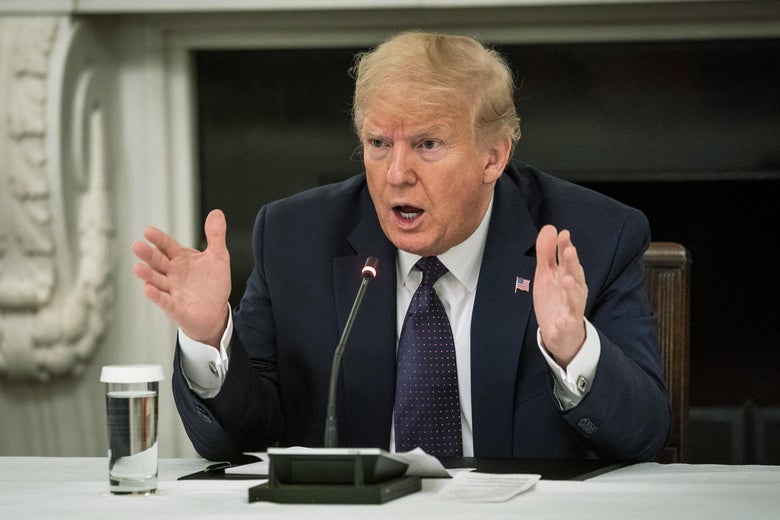
On Monday, President Donald Trump escalated his bizarre and unexplained obsession with the malaria drug hydroxychloroquine when he announced that he has personally started taking the drug as a "preventative" measure to combat COVID-19, which, as far as we know, he does not have.
There is no evidence that the drug works in response to COVID-19, either as a treatment for the disease or prophylactically, as the president claims to be using it. There hasn't been much good evidence to suggest it works as a treatment: One study of COVID-19 patients in Veterans Affairs hospitals published last month found a higher incidence of deaths in patients taking hydroxychloroquine, though that study was not a proper clinical trial but rather a more unreliable observational study. But two separate studies of clinical trials of patients in New York published earlier this month independently found that there was no benefit to hospitalized patients taking the drug. One study of 1,438 patients across 25 New York hospitals between March 15 and March 28 published in the Journal of the American Medical Association found that use of the drug "was not associated with significantly lower in-hospital mortality." Another study of 1,376 patients hospitalized in Manhattan's New York-Presbyterian Hospital/Columbia University Irving Medical Center between March 7 and April 8 found that "patients who received hydroxychloroquine had the same risk of intubation or death as patients who did not receive the drug" and "hospitalized patients with COVID-19 illness should not be routinely treated with hydroxycholoroquine."
In late April, the Food and Drug Administration offered a warning advising doctors that they should not be prescribing hydroxychloroquine to patients outside of an acute clinical setting, because the drug has been associated with heart problems. There has also been some research into the prophylactic use of the drug to prevent COVID-19-last month, Henry Ford Hospital began the first large-scale study of front-line hospital workers using hydroxychloroquine as a preventative treatment. But the results of that study are not scheduled to be available for another three months.
It is unclear why Trump is pushing hydroxychloroquine so aggressively, but he has been focused on the drug for several weeks. During Monday's roundtable event with restaurant owners, Trump was asked by a reporter about a Department of Health and Human Services whistleblower named Rick Bright. Bright, who testified before Congress last week, has claimed in a complaint that he was demoted for attempting to resist pressure to make the drug more widely available for use in COVID-19 patients. Bright says he was resistant because of concerns he had over the drug's safety. Trump answered the reporter's question by criticizing Bright and then saying that he had been taking the drug "for about a week and a half now."
"I just want to be open with the American public because I happen to think it's good," said Trump, who also endorsed deadly disinfectant injections last month.
Trump said he was taking it "because I think it's good. I've heard a lot of good stories. And if it's not good, I'll tell you. ... I'm not going to get hurt by it."
The president added that the White House physician had not recommended that he take it, but said that he could take it if he wanted to. "I said, 'Yeah, I'd like it. I'd like to take it,' " Trump added.
When asked if he had any proof that it worked on a preventative basis, Trump said: "Here's my evidence. I get a lot of positive calls about it. The only negative I've heard was the study with ... the VA, with people that aren't big Trump fans."
Trump also repeatedly claimed that many front-line workers were taking the drug as a precautionary measure, which, considering the Henry Ford Hospital study, is sort of true but also misinterprets what a clinical trial is.
The New York Times reported last month that Fox News opinion hosts began promoting the drug as a miracle cure in mid-March after a French doctor touted the drug's effectiveness, citing the results from a small and anecdotal sampling. Soon after, Trump began pushing the drug as a "very, very exciting treatment" that "can be taken safely." This contradicted the advice of Anthony Fauci, the director of the National Institute of Allergy and Infectious Diseases, who has said that it was a mistake to "assume something works based on an anecdotal report that's not controlled."
On Monday afternoon, at least one Fox News host seemed less enthusiastic about the drug's potential:
Fox News's Neil Cavuto is stunned by Trump's announcement that he's taking hydroxychloroquine: "If you are in a risky population here, and you are taking this as a preventative treatment ... it will kill you. I cannot stress enough. This will kill you." pic.twitter.com/e6D5alfAgc
- Aaron Rupar (@atrupar) May 18, 2020